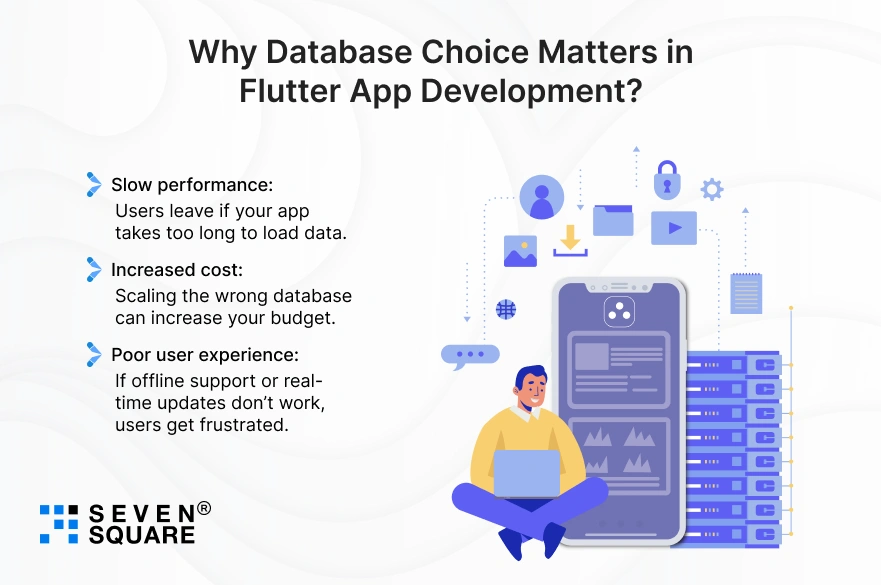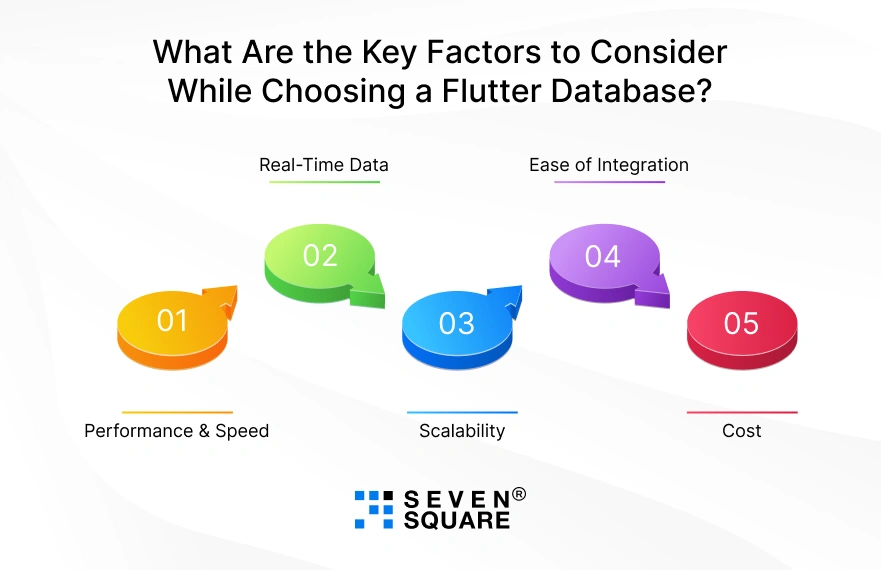When you’re building a Flutter app, your choice of database can be the reason for the app’s success.
While working with startups and enterprises, we have seen how Flutter database selection can affect your app.
A wrong decision early on often leads to slow apps, scaling problems, or higher costs later. Flutter developers today face unique challenges:
- Some apps need real-time data updates (like chat apps).
- Others require scalable databases for mobile apps that can handle thousands of users.
- Many demand offline-first databases so users can continue working without the internet.
That’s why choosing the right database for Flutter apps is a strategic decision that directly affects performance, user experience, and business growth.
Here in this blog, you can learn about the best database for Flutter apps and decide which one is suitable for your app.
Why Database Choice Matters in Flutter App Development?

We always explain to clients that a database is the backbone of their Flutter app. If you pick the wrong one, here’s what can happen:
- Slow performance: Users leave if your app takes too long to load data.
- Increased cost: Scaling the wrong database can increase your budget.
- Poor user experience: If offline support or real-time updates don’t work, users get frustrated.
For example, a real-time Flutter app like a live chat or sports score tracker needs a real-time database for Flutter like Firebase.
But a simple offline notes app can run smoothly with a lightweight local database like SQLite.
This is why understanding Flutter database performance and planning for the future is so important. The database you choose affects how it will scale tomorrow.
What Are the Types of Databases for Flutter Apps?
There’s no single “best database for Flutter apps.” We suggest options based on each project’s needs. Broadly, databases fall into two categories:
1. SQL Databases (Structured)
SQL databases are ideal when your Flutter app needs structured data, complex queries, or financial-grade accuracy. Common choices include:
- SQLite: Lightweight and great for offline storage inside the app.
- PostgreSQL: Powerful and scalable for enterprise apps.
- MySQL: Popular open-source choice for structured data.
These are stable, well-tested, and perfect when consistency and structure are top priorities.
2. NoSQL Databases (Flexible)
NoSQL databases are better when your Flutter app requires flexibility, scalability, or real-time data sync. Common options include:
- Firebase Firestore / Real-time Database: Excellent for chat apps, live tracking, and apps that need instant updates.
- MongoDB: Great for handling large, unstructured datasets.
- Couchbase: Combines NoSQL flexibility with offline-first capabilities.
These databases are best when your app grows fast or deals with dynamic, user-driven content.
SQL vs NoSQL for Flutter: Which One to Choose?
This is one of the most common questions we get. The answer depends on your app:
- Go with SQL if your Flutter app needs reliability, structured data, and advanced reporting.
- Choose NoSQL if you need real-time updates, faster scaling, or are building social, chat, or collaborative apps.
We often guide clients through SQL vs NoSQL for Flutter by looking at their business goals, app size, and budget before recommending the right database.
What Are the Key Factors to Consider While Choosing a Flutter Database?

Choosing the right database for a Flutter app can make or break its success. Let’s break down the key factors you should consider before deciding.
1. Performance & Speed
- If your app deals with large volumes of data, speed is non-negotiable.
- The best database for Flutter apps handling large data should minimize query response times and handle heavy loads without slowing down the app.
- For example, PostgreSQL works well for structured enterprise apps, while MongoDB handles flexible, unstructured data better.
- We always benchmark Flutter database performance during development so your users get a smooth, lag-free experience.
2. Real-Time Data
- For apps like chat messengers, live score platforms, or collaborative tools, you need a real-time database for Flutter apps.
- Firebase and Supabase are popular choices here, as they push updates instantly across all devices.
- We integrated Firebase into a sports app so users could get ball-by-ball updates, which proves how much of a game-changer real-time databases are.
3. Scalability
- Your app may start small, but will it still perform well when you scale to thousands (or millions) of users?
- That’s where scalability comes in. The question to ask is: Which database is best for large Flutter apps?
- For smaller apps, SQLite might do the job. But for apps expecting heavy growth, PostgreSQL, MongoDB, or Firebase are smarter long-term bets.
- We help our clients plan this early so they don’t face costly migrations later.
4. Ease of Integration
- Flutter developers rely on community-driven packages, APIs, and plugins.
- A database with strong Flutter integration support saves time and reduces bugs. Firebase, for instance, comes with excellent plugins, while PostgreSQL and MongoDB have solid APIs.
- We also evaluate how easily your team can handle the database over time.
5. Cost
- The cost of database integration in Flutter apps can vary a lot depending on your choice.
- Firebase, for example, charges based on usage, which can get expensive as your app grows.
- Self-hosted options like PostgreSQL or MongoDB may have higher setup costs but become more cost-effective long-term.
- We help you balance performance, scalability, and cost, so you don’t overspend today or struggle with limits tomorrow.
Popular Databases for Flutter Apps (with Pros & Cons)
Clients often ask us: “What is the best database for Flutter apps?”
The truth is, the answer depends on your app’s needs. Here are three of the most popular databases we use in Flutter projects, along with their pros and cons:
1. MySQL
MySQL has been around for decades and is still a top choice for many apps.
When you have used PHP & Laravel as the backend for your Flutter app, MySQL is one of the best options.
Pros:
- Highly reliable for structured data.
- Large community and plenty of support.
- Works well for enterprise-level applications.
Cons:
- Not ideal for highly dynamic, unstructured data.
- Real-time capabilities require additional setup.
We suggest MySQL when your Flutter app needs strong consistency, structured records, and well-defined relationships.
2. MongoDB
MongoDB is a flexible, NoSQL database that works great for apps where data doesn’t always fit into a rigid table.
When you have used NodeJs as the backend for your Flutter app, MongoDB is one of the best options.
Pros:
- Perfect for unstructured and semi-structured data.
- Scales easily as your app grows.
- Great fit for real-time, content-heavy apps.
Cons:
- Requires proper indexing to avoid performance slowdowns.
- Can be costlier to manage at scale.
We suggest MongoDB for content-driven apps and apps where users generate a lot of varied data.
3. PostgreSQL
PostgreSQL is known as the “developer’s database” because it is powerful, scalable, and flexible.
Pros:
- Excellent for handling large datasets.
- Supports both structured (SQL) and unstructured (JSON) data.
- Advanced features for analytics and performance tuning.
Cons:
- Slightly more complex to manage than MySQL.
- Needs expert setup for scaling.
We suggest PostgreSQL when building large-scale Flutter apps that demand performance, scalability, and complex queries.
Explore the Comparison of MongoDB vs PostgreSQL.
How Do We Choose Databases in Real Flutter Projects?
We’ve successfully delivered Flutter apps across industries by carefully choosing the right database.
Here’s how our Flutter app database integration decisions played out in real projects:
1. Tasty Meal Recipes App: MongoDB
- For this recipe app, users needed to upload and view diverse types of content like images, ingredients, preparation steps, and comments.
- We chose MongoDB because it’s perfect for managing unstructured data and scaling content-heavy apps.
- This decision made the app highly flexible and fast, with a smooth user experience even when handling thousands of recipes.
2. Self-Study UPSC Preparation App: MongoDB
- This UPSC preparation app needed to store study materials, mock tests, videos, and discussion threads.
- We integrated MongoDB because of its flexibility to handle varied content formats and its ability to scale as the number of students grew.
- Students can access real-time updates and a variety of learning resources smoothly.
3. CountMee Logistics App: MySQL
- CountMee is a delivery and logistics app where structured records (delivery IDs, users, routes, invoices) were important.
- We selected MySQL since it excels at structured data management and ensures reliability at scale.
- The result? A robust system where businesses could track deliveries without worrying about missing or inconsistent data.
When it comes to database selection for Flutter apps, there’s no universal winner.
Each database serves a different type of app requirement.
What matters is choosing the database according to your app’s features, performance needs, and long-term growth plans.
Best Practices & Developer’s Checklist
We’ve seen how developers often rush into picking a database, only to regret it later when the app slows down, costs spike, or scaling becomes a nightmare.
To avoid these pitfalls, here’s our developer’s checklist on how to choose a database for Flutter apps.
Step 1: Define Your App’s Needs
- Is it an offline-first app? (like a note-taking or travel app): Use SQLite.
- Does it need real-time updates? (like a chat or food delivery app) Use MongoDB.
Step 2: Estimate Traffic & Scale
- Small apps (with <10k users): Lightweight databases like SQLite work well.
- Large apps (with millions of users): Go for PostgreSQL or MongoDB depending on the use case.
Step 3: Budget & Maintenance
- Want low setup cost and faster go-to-market? Cloud-hosted options like Firebase are great.
- Need long-term cost control and customization? Go for self-hosted solutions like MySQL, MongoDB, or PostgreSQL.
Step 4: Match SQL vs NoSQL Options
- SQL (MySQL, PostgreSQL, and SQLite): Best when data is structured and relationships are important.
- NoSQL (MongoDB, Firebase, Couchbase): Best for unstructured, dynamic, or real-time data.
We use this exact framework to guide our clients.
It simplifies the complex question of how to choose a database for Flutter apps and ensures that the chosen solution works in the future.
Want to Select the Best Database for Your Flutter App? Contact Us Now!
Choose the Right Database for Your Flutter App
The best Flutter database depends on your app’s performance, scalability, and real-time needs.
We specialize in Flutter app database integration and help businesses with smart database selection for Flutter apps to ensure long-term success.